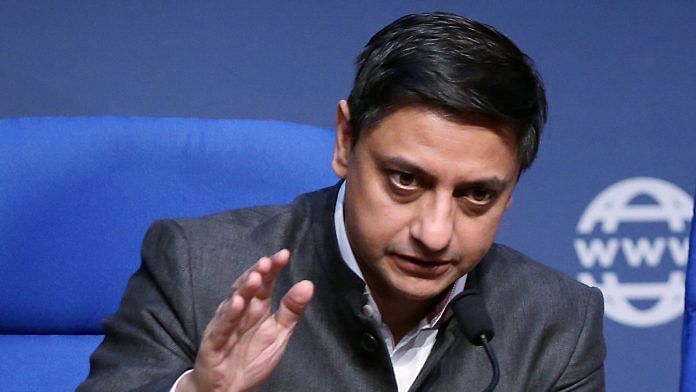New Delhi: The Indian economy will grow at more than the 11 per cent real GDP growth projected by the latest Economic Survey for the year 2021-22, Sanjeev Sanyal, Principal Economic Advisor in the Finance Ministry, said as he expressed confidence in the country’s economic recovery.
The statement comes at a time when India is grappling with rising cases of Covid even as vaccinations continue at a crawling pace. The double digit growth rate for next year comes on the back of a steep economic contraction of 7.7 per cent forecast for the current fiscal.
In conversation with ThePrint’s Editor-in-Chief Shekhar Gupta at Off the Cuff, Sanyal said the survey’s 2021-22 growth forecast was a “conservative” estimate.
“In the Economic Survey, we talk about a 11 per cent real GDP growth rate and a nominal GDP growth rate of over 15 per cent. But, I think that is a conservative number. I would be very surprised if it is not significantly higher than this,” Sanyal said, adding that India would see a “very strong” recovery.
He also pointed out that barring sectors like international travel, most other sectors are showing strong recovery.
Asked about what the rising Covid-19 cases could mean for the economy, he said, “I never write off the possibility of new strains coming and causing all kinds of other disruptions. But I’m also an optimist. I think we did rather well in containing the first round. Vaccines are on the way.”
He added that there was a case for proceeding with the vaccination process step by step.
Sanyal explained that the post-Covid world will be different from the pre-Covid world. It would have its own technology, consumer behaviour, supply chains, etc, he said, stressing the need for India to create physical infrastructure and a simple taxation regime to create space for “animal spirits” of the private sector.
During the interaction, Sanyal spoke about the underlying concept behind ‘Atmanirbhar Bharat’ and how it must not be seen as an attempt to return to 1991 reforms. “The prime minister has no interest going back to driving in Ambassador cars,” Sanyal said.
Also read: India’s rising virus cases risk denting economic recovery
On Haryana’s new reservation policy
Touching upon the impact of the reservation policy announced by the Haryana government, Sanyal said “competitive federalism” could lead to corporate firms moving out of Gurugram.
The Haryana government has announced that it will reserve 75 per cent of private sector jobs, until a certain salary cap, for local candidates.
Sanyal said, “One of the interesting things that will happen here, because you can no longer protect the goods market, trying to provide protectionism to labour market will have interesting consequences because there is a huge incentive for other states to wean away your businesses since they can sell you the goods from anywhere.”
Asked about what his advice for the Haryana government would be, Sanyal said his suggestion would instead be for the competitive states to come to Gurugram (Haryana’s biggest business hub) and let “competitive energies” of states come into play.
Privatisation of banks
In light of the protests against privatisation of banks, Sanyal said opposition to the move isn’t surprising.
While presenting the Union Budget this year, Finance Minister Nirmala Sitharaman had announced the privatisation of public sector banks (PSBs). The government is expected to sell stake in at least two PSBs as part of its privatisation drive in the next financial year.
Sanyal said these aren’t “simple things” to do and if there was no opposition to it, someone else would have done it. However, he reiterated the government’s stance on the privatisation of banks.
“My view is that it needs to be done, while the exact way in which it was done can be smoothened out,” he said, adding that the need to privatise certain areas is “clear”.
Sanyal made his case for how the private sector can be allowed a “bigger space” in the banking sector. However, he said he had misgivings in allowing corporate houses to own banks without ensuring adequate safeguards.
“In case of allowing corporate sector to come, there’s an additional problem of conflict of interest,” he said.
He pointed out that the question of who decides on credit quality arises in such cases. Terming it a “complicated issue”, Sanyal said some restrictions for the same have to be carefully designed.
(Edited by Amit Upadhyaya)
Also read: From grocers to tailors, Amazon is fighting door to door to beat Mukesh Ambani’s Reliance




